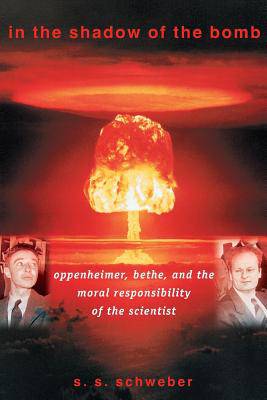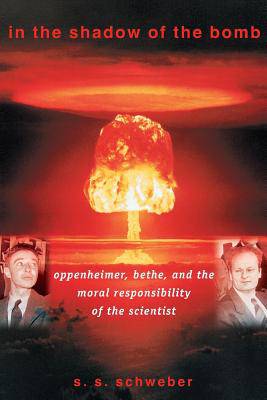
- Afhalen na 1 uur in een winkel met voorraad
- Gratis thuislevering in België vanaf € 30
- Ruim aanbod met 7 miljoen producten
- Afhalen na 1 uur in een winkel met voorraad
- Gratis thuislevering in België vanaf € 30
- Ruim aanbod met 7 miljoen producten
Zoeken
In the Shadow of the Bomb
Oppenheimer, Bethe, and the Moral Responsibility of the Scientist
S S Schweber
€ 67,95
+ 135 punten
Omschrijving
How two charismatic, exceptionally talented physicists came to terms with the nuclear weapons they helped to create
In 1945, the United States dropped the bomb, and physicists were forced to contemplate disquieting questions about their roles and responsibilities. When the Cold War followed, they were confronted with political demands for their loyalty and McCarthyism's threats to academic freedom. By examining how J. Robert Oppenheimer and Hans A. Bethe--two men with similar backgrounds but divergent aspirations and characters--struggled with these moral dilemmas, one of our foremost historians of physics tells the story of modern physics, the development of atomic weapons, and the Cold War. Oppenheimer and Bethe led parallel lives. Both received liberal educations that emphasized moral as well as intellectual growth. Both were outstanding theoreticians who worked on the atom bomb at Los Alamos. Both advised the government on nuclear issues, and both resisted the development of the hydrogen bomb. Both were, in their youth, sympathetic to liberal causes, and both were later called to defend the United States against Soviet communism and colleagues against anti-Communist crusaders. Finally, both prized scientific community as a salve to the apparent failure of Enlightenment values. Yet their responses to the use of the atom bomb, the testing of the hydrogen bomb, and the treachery of domestic politics differed markedly. Bethe, who drew confidence from scientific achievement and integration into the physics community, preserved a deep integrity. By accepting a modest role, he continued to influence policy and contributed to the nuclear test ban treaty of 1963. In contrast, Oppenheimer first embodied a new scientific persona--the scientist who creates knowledge and technology affecting all humanity and boldly addresses their impact--and then could not carry its burden. His desire to retain insider status, combined with his isolation from creative work and collegial scientific community, led him to compromise principles and, ironically, to lose prestige and fall victim to other insiders. S. S. Schweber draws on his vast knowledge of science and its history--in addition to his unique access to the personalities involved--to tell a tale of two men that will enthrall readers interested in science, history, and the lives and minds of great thinkers.Specificaties
Betrokkenen
- Auteur(s):
- Uitgeverij:
Inhoud
- Aantal bladzijden:
- 288
- Taal:
- Engels
- Reeks:
- Reeksnummer:
- nr. 39
Eigenschappen
- Productcode (EAN):
- 9780691127859
- Verschijningsdatum:
- 7/01/2007
- Uitvoering:
- Paperback
- Formaat:
- Trade paperback (VS)
- Afmetingen:
- 162 mm x 234 mm
- Gewicht:
- 426 g

Alleen bij Standaard Boekhandel
+ 135 punten op je klantenkaart van Standaard Boekhandel
Beoordelingen
We publiceren alleen reviews die voldoen aan de voorwaarden voor reviews. Bekijk onze voorwaarden voor reviews.











